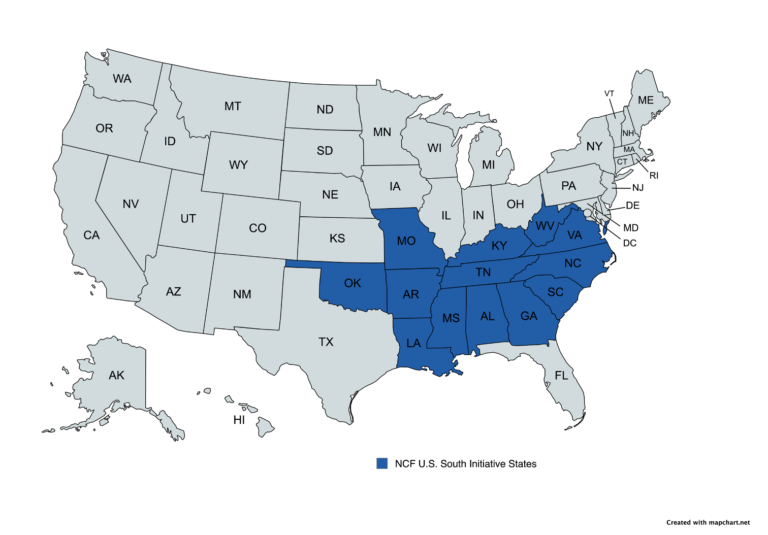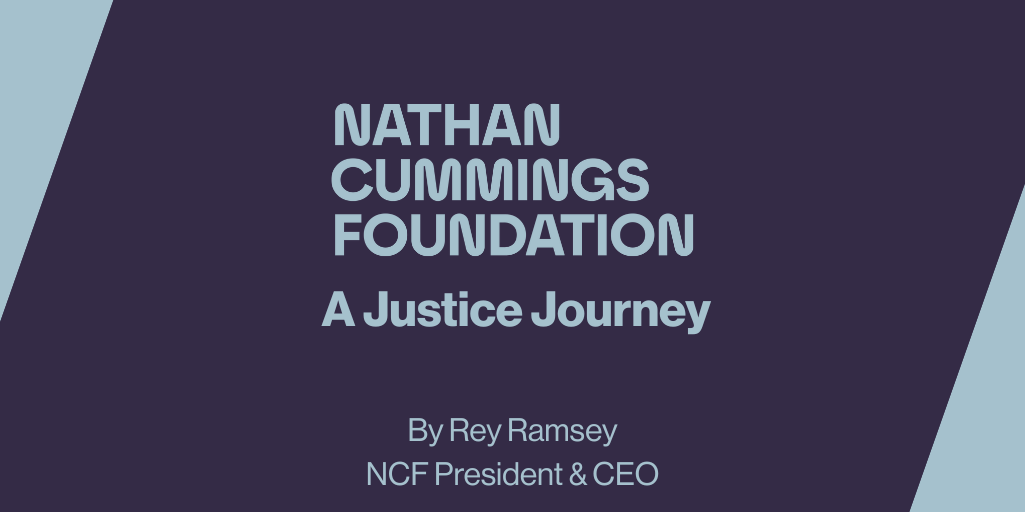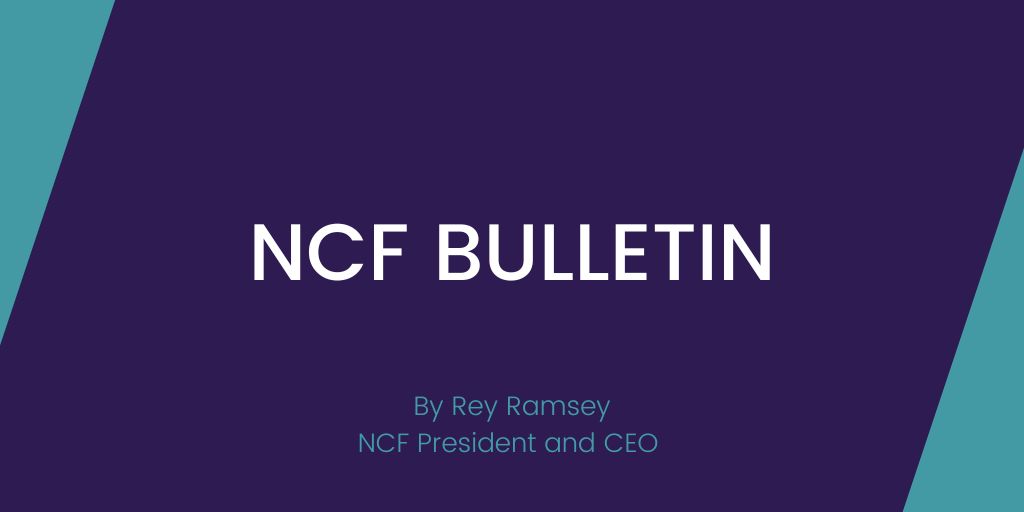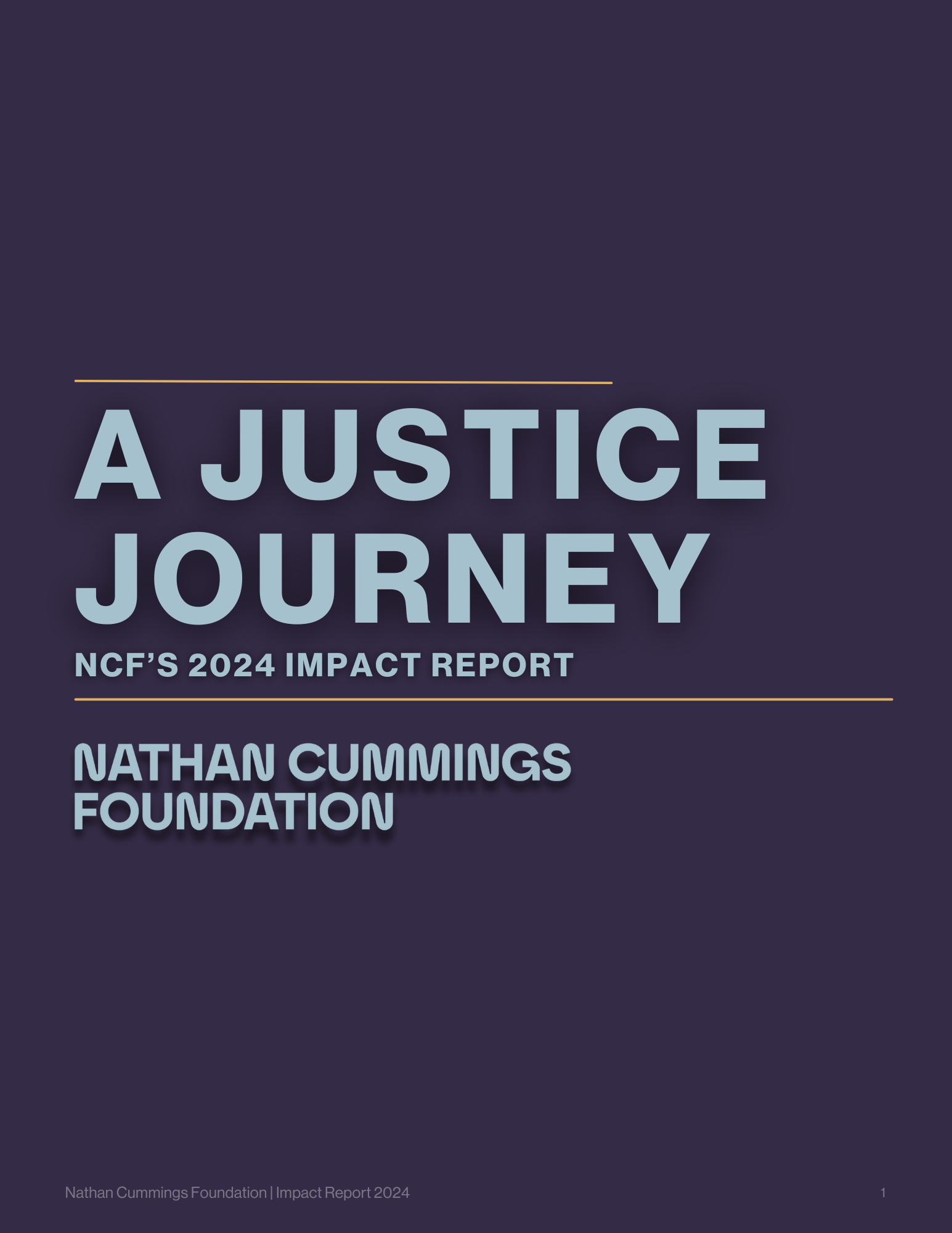New York, NY – The Nathan Cummings Foundation (NCF) announced today that it is accepting proposals for grants and program-related investments (PRIs). This grant and PRI opportunity flows from the foundation’s strategic plan to activate the totality of its assets to support organizations driving people-centric impact outcomes toward racial, economic, and environmental justice (REEJ).
“We are excited to have an open line for values-aligned organizations and innovators to reach us,” said NCF President and CEO Rey Ramsey. “They hold the keys to how we advance impact solutions. We will listen and learn from them.”
The foundation has an approximately $17 million grantmaking budget for 2024 and will offer three new types of grants:
- Venture Grants: (up to $100K): These grants are short-term and designed to provide expedited support to social entrepreneurs with breakthrough and innovative solutions.
- Advancement Grants: (up to $250K) These grants are designed to provide two-year support to project-based work and/or help scale organizations and promising solutions.
- Enterprise Grants: ($250k+) These grants are designed to provide multi-year, unrestricted funding to partners that have deep alignment across our REEJ focus areas and offer the most opportunity to use all our financial and nonfinancial resources to support their solutions.
The PRI initiative is backed by the board’s recent decision to dedicate five percent ($22 million) of the foundation’s endowment in the coming years to provide low-interest loans and other forms of low-cost financing to organizations focused on REEJ. The foundations budget for the initiative’s first year is targeted at approximately $3 million.
The deadline for submissions is April 30, 2024. NCF encourages applicants to review the “Apply for Funding” section of its website for guidance.
For additional information about this announcement, please contact NCF’s Director of Communications Candice Wynter, at Candice.Wynter@nathancummings.org.
Dear partners and friends,
I am excited to share with you Nathan Cummings Foundation’s 2024 Impact Report. This report is not just a retrospective; it reflects our ongoing commitment to sharing what we’re learning, how we’re investing, and where we’re going. We believe that in order to advance racial, economic, and environmental justice, we must lean into transparent collaboration and data sharing.
Click here to View the 2024 Impact Report
We have an opportunity — and a responsibility — to make our strategies, challenges, and course corrections visible as we seek to make innovative investments in our pursuit of solutions.
That’s why our team put deep thought, time, and care into producing our 2024 Impact Report which includes:
-
A look at how we’re operationalizing our Totality of Assets approach — activating our people, capital, relationships, knowledge, and voice to contribute to systemic change.
-
Details on our new organization-wide Key Performance Indicators (KPIs) that begin to measure our contributions to narrative change, just policies, resource flows, and innovative models.
-
Our strategy to commit 40% of our assets — financial and non-financial — to racial, economic, and environmental justice work in the U.S. South.
-
A snapshot of our mission-aligned investing work, including how we’re working with values-aligned investment partners to reduce bias and surface under-recognized talent.
-
A highlight of our shareholder activism, including a campaign that influenced Walmart’s decision to offer bonuses to 700,000 hourly workers.
-
Our place-based strategy for Israel-Palestine, focusing on civic and economic outcomes, just sustainability, and democratic infrastructure.
-
Case studies and partner spotlights that show what it looks like when we leverage the full weight of our foundation’s assets into alignment for impact.
We will continue publishing impact reports every year and encourage your feedback. Your input helps NCF to continuously improve the reports and the work they detail.
Yours in partnership,
Rey Ramsey
President & CEO
Nathan Cummings Foundation
Justice is not illegal, and advocacy for ideas and reforms to elevate the human condition and spirit are protected by the U.S. Constitution. We will not allow the fog of injustice to impair our sightlines in the pursuit of fairness.
Nathan Cummings Foundation has long partnered with institutions and individuals on a justice journey to improve unfair systems. Acceptance of the status quo would legitimize a view of our nation where ongoing economic disparity is considered acceptable. Data shows that far too many people lack access to opportunities and must navigate a path littered with obstacles. As a foundation, we have the duty and privilege to invest in solutions to address these longstanding problems.
We made an informed decision in November 2017 to allocate 100% of our endowment to mission-related and impact investments. In doing so, we rejected the false choice between quality financial returns and using capital to achieve positive societal outcomes. As a fiduciary of capital and a stakeholder in this world, we see the benefits of investing with purpose and what this means for people and the planet. And the results have been positive and measurable.
Justice Never Stands Still
In November 2022, we adopted a strategic plan to guide our efforts. We embraced a “Totality of Assets” approach that leverages all financial and people capital to advance Racial, Economic, and Environmental Justice. This North Star guides our actions, from grants and lending to communications and our endowment, and more.
Today, our humble journey continues unabated by words, distractions, and distortions. We do what we do not as a response to any point of view but because of our values, which are not seasonally adjusted. They endure!
Nothing we do is a solo endeavor, and we continue to seek partners and ideas. We embrace the interdependence that creates new pathways of opportunity creation and solutions.
Along the way, we know that we will not always agree with how they see the world, but our eyes clarify our sightlines, and the data informs our minds enough to know that we have not reached justice for all. We will keep working until then.
Justice requires a journey, and for the sake of all, it must – and shall – continue.
Rey Ramsey
President & CEO
Nathan Cummings Foundation
In 2022, Nathan Cummings Foundation’s (NCF) Board of Trustees voted unanimously to approve our five-year strategic plan. Three years later, with Racial, Economic, and Environmental Justice (REEJ) as our North Star, NCF is leveraging the totality of our assets to advance every part of our strategy. This includes the recent passage of a strategy by our board to begin deeper collaborations in the U.S. South (left) as part of NCF’s place-based initiatives.

NCF will continue supporting national work but will leverage 40% of our assets — both financial and non-financial — to support REEJ-aligned solutions across the U.S. South in concert with stakeholders in the public and private sectors. Our “Solutions Teams,” featuring NCF team members from across the organization, will dedicate funds (grants and program-related investments) along with other assets to advance catalytic opportunities in the region and will source partnerships to provide support at the local, regional, and national levels.
Why Focus on the U.S. South?
For over a century, communities across the U.S. South have endured systemic discrimination, disinvestment, and resource extraction. Today, they remain underfunded, receiving less than 3% of national philanthropic dollars. Despite these challenges, transformative work is unfolding across the region. As an NCF partner articulated, Southern changemakers are used to “making a dollar out of 10 cents,” demonstrating resilience, innovation, and collaboration that often go unrecognized by philanthropic institutions.
The innovative solutions emerging from these communities are locally rooted, shaped by those most proximate to the issues, and deeply informed by a vision for justice. Yet, their work is not just about regional change — it has the power to inspire and inform efforts nationwide. By listening, learning, and showing up as partners, we hope to amplify and support these movements in ways that aren’t simply impactful but enduring.
Facilitating Success, Not Imposing Solutions
The most effective solutions emerge from within the communities themselves. Too often, well-intentioned initiatives falter when they fail to reflect local priorities or when they are introduced without genuine community ownership. The ability to organize around shared goals and deploy resources strategically is a critical factor in success. At times, this requires a shift in perspective or the presence of conveners who can bridge sectors and disciplines.
NCF is committed to joining teams already at work to support and elevate the leadership and innovations driving change. Our role isn’t to impose strategies or solutions but to facilitate success by ensuring that those closest to the work have the resources, visibility, and partnerships they need.
What’s Next?
The road ahead involves deepening relationships with local communities, strengthening collaborative networks, and learning from those who have long been advancing justice in the region. This work is grounded in mutuality, continuous learning, and a belief that meaningful change happens when we create the conditions for leadership, creativity, and solutions to flourish on their terms.
NCF will apply our Totality of Assets approach in the U.S. South, leveraging our people, relationships, knowledge, voice, and financial resources in service of community-led change. This includes deploying a mix of capital sources, fostering collaboration, and convening partners across geographies that advance justice and work to reshape public understanding. Above all, our goal is to ensure that the voices, expertise, and trust of local leaders and organizations are at the center of this work.
By showing up with humility, curiosity, and a commitment to long-term partnership, we hope to help catalyze a more just and equitable future — in the U.S. South and beyond.
Thanks for reading. I look forward to continuing to provide updates on this work throughout the year.
In partnership,
Rey Ramsey
President & CEO
Dear partners and friends,
I’m delighted to share with you Outcomes that Matter, the Nathan Cummings Foundation’s first-ever Impact Report. I know the publication of a report is not Earth-shattering news, but it’s a big deal for me. One of my highest priorities as CEO of this foundation is making our foundation more transparent. My career in the public, private, and nonprofit sectors has convinced me that greater transparency drives greater impact.
Many foundations collect a wealth of information, but almost all of it lives in internal documents that simply collect dust. If we can make more of this information public, we can seize innovations in learning and improvement, and take advantage of one our sector’s biggest natural advantages: the ability to join forces with others without risking the loss of trade secrets, profits, or market share. Just as important, we can send positive signals to the public at a time when trust in institutions is shockingly low.
That’s why my team and I invested a lot of time and effort in producing Outcomes that Matter. If you read the report, you’ll find the following:
- Details on how we’re implementing the board’s bold decision to invest 100 percent of our endowment assets for mission-aligned impact
- Clarity on what areas of work we are now funding as part of our exclusive focus on advancing racial, economic, and environmental justice (REEJ)
- Infographics showing how we allocated all of our grants last year, including the racial and gender makeup of our grantee partners’ leadership teams
- Information on our new $22 million program-related investment (PRI) portfolio
- Results of the four shareholder proposals we filed during the 2023 proxy season
- Case studies on three ways we recently used the totality of our assets (e.g., shareholder activism, impact investments, PRIs, grants, and strategic communications) to advance people-centered impact.
We’ll be publishing impact reports every year. So please share your feedback. We’ll use your input to continuously improve the reports and the work they detail.
Advancing transparency for impact,
Rey Ramsey
As I shared with you in January, the Nathan Cummings Foundation board decided to focus the totality of the foundation’s assets on advancing racial, economic, and environmental justice (REEJ). Today, I am excited to share our definitions of these broad terms and explain how we will direct resources to support REEJ solutions.
Racial justice is the removal of structural barriers and hierarchies based on race. It seeks to reimagine political, economic, and social systems in ways that allow all people to thrive, regardless of their racial identity. To advance racial justice, we will support organizations that address the following focus areas:
- Civic Engagement: We support efforts to ensure that BIPOC and other marginalized communities have the access and capacity to participate freely in shaping the policies, practices, and institutions that impact their everyday lives.
- Racial Wealth Gap: We support efforts that seek to repair historical harm, build wealth, and address the root causes of the racial wealth gap.
- Racism + Oppression: We support efforts to build the infrastructure and capacity necessary to create systems that are free from oppression and allow us all to thrive.
Economic justice means that everyone has opportunities to participate and thrive in the economy, including those who are marginalized by our current economic systems. Economic justice creates a stronger economy, because prosperity and equity go hand in hand. To advance economic justice, we will support organizations that address the following focus areas:
- Economic Security: We focus on systemic efforts to mitigate economic precarity and secure a path to a more stable future for poor and low-income people.
- Access to Capital:We support efforts to provide more access to capital for historically excluded entrepreneurs and to cultivate an ecosystem in which they can prosper.
- Monopoly Power: We focus on efforts to decrease corporate power and create a level playing field for workers, marginalized communities, and small businesses.
Environmental justice is the right of all people and communities to a clean, healthy, and safe environment. It promotes equal environmental protection under the law and in fact. It empowers all communities to make informed decisions and fully participate civically and economically in the creation of environmental solutions. To advance environmental justice, we will support organizations that address the following focus areas:
- Environmental Harms: We focus on systemic efforts to prevent and repair environmental disparities and to ensure affected communities can meaningfully engage in solutions that protect both public health and ecosystems.
- Inclusive Participation in the Green Economy: We focus on efforts to ensure BIPOC-led environmental organizations and diverse companies have access to and can take full advantage of Green Economy opportunities.
- Regenerative Economic Models: We focus on social entrepreneurs and innovators who build regenerative projects and models based on sustainability, ecological restoration, resilience, and community wealth-building.
Now that we have clarity on definitions and focus areas, we are ready to seek partners who will lead the way in driving meaningful outcomes and impact. To support that search, we will be opening our website for letters of inquiry (LOI) for grants and program-related investments (PRIs), starting in January 2024. We will share more details on the LOI process soon. If you have any questions or comments in the meantime, please reach out to communications@nathancummings.org. I welcome your feedback!
In pursuit of solutions,
Rey Ramsey
President and CEO
As a foundation rooted in the Jewish principle of Tikkun Olam, which positions justice as a pathway to repair the world, we are horrified and heartbroken by Hamas’s terrorist atrocities against innocent Israeli civilians. We mourn the lives lost in this murderous rampage, pray for a swift release of all hostages, and condemn all forms of hate and violence.
While this is a dark and difficult time, we remain hopeful and steadfast in our support of partners working to systemically advance racial, economic, and environmental justice in Israel-Palestine.
We know the road to peace and justice in the region is a long one. As we support that journey as a diverse and multiracial collective, we are united by our commitment to our values. We stand in solidarity with our partners and all those who share them.
Staying true to our value of listening and learning, we updated this statement on October 11 based on new developments and understanding from our community.
The Nathan Cummings Foundation is pleased to announce that Kristi Cunningham Whitfield will join the Foundation as our first Chief Impact Officer and Director of Racial Justice. In this role, Kristi will help guide and measure our strategic effort to leverage all the foundation’s assets in ways that advance impact toward racial, economic, and environmental justice (REEJ). She will also oversee our racial-justice grantmaking. Her first day is October 11, 2023.
“I know from first-hand experience that Kristi is a dynamic leader who finds solutions outside the box and approaches her work with curiosity, passion, and integrity. When it comes to carrying forward our strategic plan and relentless pursuit of impact, I can’t think of a more seasoned executive for the job,” says Rey Ramsey, CEO and President.
“It’s an honor to have this opportunity to work with the foundation’s bold leadership to explore what’s not only possible but necessary to advance racial, economic, and environmental justice,” says Kristi. “NCF is on an admirable journey to use all its assets to support some truly incredible work and solutions, and I’m looking forward to embarking on that journey together.”
The through line of Kristi’s career, which spans the nonprofit, for-profit, and government sectors, is social justice and balancing the scales of opportunity. While she has many guiding mantras, one that you’ll hear her often say is “Socio-economic status should never determine one’s access to opportunity.”
Kristi started her career as an advocate for community-based housing and economic development in Boston and Washington, DC. She later expanded to the national level in her role as the coordinator of the $65M National Community Development Initiative for the Enterprise Foundation. Most recently, Kristi served as the Director of the DC Department of Small and Local Business Development, where she oversaw the allocation of over $1B to the small business community, created a $6M fund to support community wealth building through property ownership, and supported business growth for people of color from the city’s most under-resourced neighborhoods.
Kristi also held a senior role with the Women’s Institute for Housing and Economic Development, worked as Director of Field Operations at the Enterprise Foundation. She previously owned the nationally recognized and DC-based Curbside Cupcakes, where she successfully advocated for groundbreaking legal reform as the Founding Chairperson of the DC Food Truck Association. As Kristi would humbly say it, she “went from an affordable housing developer to a baker and business owner to a government director.”
Kristi attended Swarthmore College, where she received a Bachelor of Arts degree in Sociology with a concentration in Black Studies, and Massachusetts Institute of Technology, where she received a Masters of City Planning degree with a focus in Housing and Community Development.
For any media inquiries, please contact Candice Wynter (Candice.Wynter@nathancummings.org).
New York, NY – The Nathan Cummings Foundation (NCF) announced today that Melissa Bradley and Daniel Tellalian will become the foundation’s newest Independent (non-family) Trustees.
Melissa is the founder and managing partner at 1863 Ventures, a business-development company and family of venture funds that delivers content and connections to New Majority entrepreneurs to foster responsible entrepreneurship and change the support and narrative around their potential and needs. Daniel is the founder and CEO of Angel City Advisors, an impact-investment consultancy that connects community voice and social enterprise to catalytic capital.
“Melissa and Daniel are rock stars in their fields,” said Rebecca Gregg, co-chair of the board’s Independent Trustee Search Committee. “We welcome their strong, independent voices and know that they both bring a fantastic combination of skills and experiences for helping the foundation use the totality of its assets to advance racial, economic, and environmental justice.”
Melissa has dedicated her professional career to supporting historically marginalized communities to create wealth via business growth and scale. She has done so in the public, private, and social sectors. She has also done so in her ongoing role as a professor of practice at Georgetown University’s McDonough School of Business, where she teaches about impact investing and related topics.
During her tenure in the Obama Administration, she served as chief strategy officer for AmeriCorps, worked in the Partnerships Office for the Department of Education, served on the intergovernmental task force for My Brother’s Keeper, and directed the White House Social Innovation Fund. During her tenure in the Clinton Administration, she served in the Treasury Department and researched small-business access and individual development accounts as well as regulated minority depository institutions. In the nonprofit sector, she founded several nonprofit organizations focused on asset and economic development and served as CEO of Tides Inc., where she managed more than $500M in assets. Melissa graduated from Georgetown University with a Bachelor of Science in Finance and earned a Master’s degree in Business Administration from American University.
“NCF invested in my organization last year, and our partnership has been very successful,” said Melissa. “As a result, I was eager to put my hat in the ring to join the NCF board. I’m excited to take on this new role as a fiduciary and lend my diverse experiences along the foundation’s pursuit of justice.”
Daniel is already part of the NCF community. Since 2020, he has served—and distinguished himself—on the foundation’s Investment Committee. He has more than two decades of experience in investing, entrepreneurship, business mentoring, financial transactions, and community economic development. Angel City Advisors is his fourth startup. First recognized by Echoing Green as a social entrepreneur for his work in the aftermath of the 1992 Los Angeles riots, Daniel now proudly manages the Signal Fund, an early-stage catalytic fund for the Echoing Green fellowship. He also spent 13 years as principal and partner at Emerging Markets, Inc., an economic development consulting firm that assisted the private sector to responsibly pursue business opportunities within place-based community development initiatives nationwide. Daniel was also a founding member and managing partner of Avivar Capital, an advisory firm focused on impact investing. He has investment and operational knowledge across a number of sectors including food, life science, climate, and real estate. Daniel holds a BS in Economics from the University of Pennsylvania’s Wharton School; an MBA from UC Berkeley’s Haas School of Business; and a JD from UC Berkeley’s School of Law. He is a licensed CPA and attorney in California.
“It’s an honor to step up my engagement with the foundation and the family,” Daniel said. “In my three years working alongside the family and Investment Committee, I’ve been impressed—and touched by—the trustees’ and staff’s humility and ideals. In this new capacity, I can give the foundation the benefit of everything I’ve learned about using the power of people and markets to advance equity.”
For additional information about this announcement, please contact Candice Wynter, at Candice.wynter@nathancummings.org.
A cornerstone decision of our five-year strategic plan is to converge the totality of our assets — people, relationships, knowledge, voice, and money — to advance impact toward racial, economic, and environmental justice (REEJ).
Here are a couple headlines about how we’re implementing that approach:
- We launched three, cross-departmental Solution Teams. At its best, impact is about the pursuit of solutions, and in our case it’s about the pursuit of solutions that advance REEJ. That’s why we’ve established three Solution Teams – one for each of the issues within REEJ. Our grants and partnerships, mission investment, communications, and people and culture teams will work collectively and side-by-side with these cross-departmental Solutions Teams to steward the foundation’s investments in ways that maximize impact toward REEJ. The Solutions Teams’ will identify impact goals and how we will make investment decisions to achieve them. Over the next few years, we will align our budgets and resource allocations accordingly.
- We introduced program-related investments to our asset pool. In 2018, we aimed to stretch our financial assets beyond the five percent required from foundations by committing 100 percent of NCF’s endowment to mission–aligned investing. Now, we’ve taken that a step further by carving out $22 million, or five percent, of our endowment for PRIs. We already made some exploratory PRIs last year to incredible organizations, including 1863 Ventures Fund, Southern Bancorp Community Partners, and South Carolina Community Loan Fund, and we are excited to enter new partnerships beginning in 2024. Stay tuned for more information.
Thanks for reading. Look out for more brief bulletins like this in the coming months.
In partnership,
Rey Ramsey
As part of my switch from interim to ongoing NCF president and CEO, I’ve decided to launch a series of quick-hitter bulletins. I’ll use these bulletins to communicate more frequently and proactively about the foundation’s work and our support of racial, economic, and environmental justice (REEJ).
I am pleased to share exciting news about the incoming leadership on our board of trustees. For the first time in the foundation’s history, the majority of the board’s executive positions are now held by fourth generation family members—that is, the great-grandchildren of Nathan Cummings.
Here are the headlines:
- Jaimie Mayer, the first fourth-generation family member to serve as board chair, has just been reelected—unanimously—to serve a second three-year term as our chair. The board sees, as do I, that Jaimie possesses the courage, creativity, and dedication to lead NCF as we seek to leverage the totality of our assets to pursue social impact.
- Amy Sorensen has just been elected to serve as vice chair of the board. Amy, who leads external relations and partnerships for the Israel-based NGO Pico Kids, has already demonstrated her leadership chops through her service as chair of the board committee focused on deploying the foundation’s assets for impact.
- Rebecca Gregg was elected to serve as board secretary. While this is her first time serving as a board officer, Rebecca has lent her warmth and intelligence to the board since 2016.
- Adam Cummings will continue his service as board treasurer, supporting the continuity and intergenerational work of the foundation.
We are also continuing to invest in and build out our independent (non-family) board leadership:
- Dimple Sahni, who previously served as an advisor to the board’s Investment Committee, will now serve as the committee’s chair. In her day job, Dimple is the Managing Director of Multi Asset Impact Investing at Anthos Fund and Asset Management, a values based asset management firm rooted in the DNA of a single family office.
- We are also actively searching for two independent trustees who are passionate about and have expertise arounds racial, economic, and/or environmental justice. Learn more and apply here.
Thanks for reading. Look out for more brief bulletins like this in the coming months.
Rey Ramsey
Nathan Cummings Foundation CEO
As we mentioned in our recent strategic plan update, we aim to combine all of the organization’s assets — people, relationships, knowledge, voice, and money — to support racial, economic, and environmental justice.
One way we do this is by leveraging our standing as an investor to shift markets and change corporate behavior by filing shareholder resolutions on issues at the intersection of our grantmaking interests and long-term shareholder value. As part of that work, we are among a growing number of investors filing racial equity and civil rights resolutions with companies.
One such resolution, led by NCF in consultation with our grantee partners at Open MIC, helped prompt the release of a report on an independent civil right rights audit at tech giant Google. The development follows ongoing pressure from members of Congress, civil rights organizations like NCF grantee partner Color of Change, and investors.
Civil rights audits, also referred to as racial equity audits, are important tools to help companies uncover and begin to remedy harmful impacts experienced by people because of their race, ethnicity, sex, and other protected characteristics. The Foundation’s 2022 proposal calling for a racial equity audit received the support of roughly 64 percent of shares not controlled by the company’s officers or directors. Our 2023 proposal was withdrawn last week contingent on the publication of a report on the audit, which covered the company’s products, practices, and policies.
The report shared key insights regarding racial equity in Google’s workplace practices, key products, economic opportunity programs, and philanthropic efforts. Recommendations included the development of a civil rights infrastructure to review and provide expertise on policies, processes, and product changes across the business and mandating the use of best practices for inclusive hiring. These and other recommendations in the report are an important first step, but companies must view these audits as the beginning of a process of improvement and growth, not the end.
As Rashad Robinson, President of Color of Change, stated, “We will ultimately assess Google’s commitment to racial justice by its willingness to implement the recommendations set forth in the civil rights review.”
Racial equity audits can yield benefits for society and enhance long-term shareholder value. We hope that more investors are encouraged to call on companies to conduct racial equity audits. Please reach out to me at laura.campos@nathancummings.org to learn more about our approach.
We ended last year with an important vote. Our board voted unanimously to approve a five-year strategic plan. The plan is the culmination of a highly engaged process guided by our values, field data, and our community. We studied social, political, and economic data, and we listened to the diverse perspectives of more than fifty partners, peers, and other issue experts. What we learned set us on a path to support systemic solutions that advance racial, economic, and environmental justice (REEJ).
To this end, we made the following strategic decisions:
We decided to make REEJ our sole focus. Through our strategic-planning process, we realized we were spreading our resources too thin to achieve transformative change. That realization, combined with a root-cause analysis of the issues at the core of our mission, drove our decision to bring all our work into alignment with REEJ. This decision covers not only our domestic work but also our work in the Israel-Palestine region.
We decided to converge all our assets for a “totality” approach to impact. We are reorganizing the ways we work so we can combine all the organization’s assets —people, relationships, knowledge, voice, and money — to support REEJ. As part of that, we will work in close coordination with Bivium Capital and Westfuller, our Outsourced Chief Investment Officer, to expand our impact-investing activities. In addition to doubling down on our shareholder activism and commitment to 100 percent mission-aligned investing, we will be introducing program-related investments (PRIs) into our portfolio.
We decided to invest more resources in the U.S. South. We know that groundbreaking work to advance REEJ is emerging from BIPOC communities in the South, even though the region has received comparatively little philanthropic support. While we will continue supporting national work, we are carving out a portion of our resources exclusively for designated place(s) in the South. We are undergoing a stakeholder-driven and data-informed process to select the “where” and “how much,” and we will share this information with you when we have it.
We decided to deepen our ethos of learning and improvement. Continuous improvement requires a commitment to learning from and listening to our partners and frontline communities. It also rests on the pursuit of data and information and the internalized belief that we do not possess all the answers. We will be developing measurement mechanisms across the foundation to hold ourselves accountable to the impact we seek, while staying true to trust-based values.
We decided to prioritize strengthening our internal culture. We know REEJ is an internal commitment as much as an external one. As one step toward that commitment, we are deepening staff and board understanding and skill on multiple issues related to racial equity and inclusion. The board is also dedicated to strengthening governance and solidifying the foundation’s leadership. Thus, it has re-elected Jaimie Mayer as Board Chair and given me the authority to lead the organization as President and CEO on an ongoing basis.
Our staff is already working to determine how to best put the board’s strategic decisions into action, and we will share more developments over the coming year. We appreciate the wisdom this community holds, and we look forward to continuing to engage you in our pursuit of REEJ.
Onwards!
Rey Ramsey
President and CEO
For inquiries please contact: Communications@nathancummings.org
Rhee, a world-class storyteller, brings a deep commitment to strengthening an inclusive democracy.
New York, NY – The Nathan Cummings Foundation (NCF) announced today that it has elected Alice Rhee to its board as an independent (non-family) trustee. During her illustrious career, she has served as a philanthropy executive, digital-video strategist, and two-time Emmy award-winning television producer. Rhee is currently Head of Strategic Partnerships & Place-Based Philanthropy at the American Journalism Project, a nonpartisan nonprofit dedicated to building and strengthening nonprofit local news organizations across the country.
“We’re delighted Alice has decided to lend her exceptional skills and lived experiences to the NCF board,” said NCF Board Chair Jaimie Mayer. “I know she will help us learn and improve in many ways, especially in our efforts to use our voice as a strategic asset for transforming systems and mindsets to promote greater justice and equity in our society.”
Ms. Rhee was born in Seoul and raised in Vancouver, British Columbia, by first-generation Korean immigrant parents. As a veteran journalist who covered domestic politics and breaking news, she has seen the human impact of our most pressing economic and social issues as they unfold in cities and regions all over the country. These experiences give her great affinity for NCF’s mission.
“The Nathan Cummings Foundation has an extraordinary history and reputation for advancing justice and flourishing for all, which is core to my career and who I am as a person,” said Ms. Rhee. “It is an honor to join this remarkable board and serve an organization that has set an example for me and for the field of philanthropy.”
Prior to joining the American Journalism Project, Ms. Rhee served as Director of Media for a third-generation private family foundation focused on holistic flourishing for families and children. There, she worked closely with the family and senior leadership team to create a storytelling and narrative change program focused on economic inequality and poverty.
Preceding her work in philanthropy, Rhee spent two decades in national news and was repeatedly recognized for her emotionally resonant storytelling on complex, historic issues.
As Senior Producer of Digital Video at The Washington Post, she led original content teams producing digital video for all of the newspaper’s editorial desks.
“Alice’s rich experience in philanthropy and media—coupled with her creativity, critical thinking skills, and deep enthusiasm for the work—make her a wonderful addition to our team,” said NCF President and CEO Kavita N. Ramdas. “Her insights on the current challenges facing democracies can help expand the foundation’s imagination and push the boundaries of our work, which is exactly what we look for in an independent trustee.”
Rhee has also demonstrated a commitment to public service. At present, she is a co-chair of the Information, Media, and Technology pillar at the Partnership for American Democracy, a bipartisan effort to shore up democratic institutions and practices.
She serves on the board of theguardian.org, the philanthropic organization that partners with The Guardian to support impactful journalism projects throughout the world and is also an advisory circle member of JustFund, the only nonprofit grantmaking platform designed by funders and nonprofit leaders of color.
Before her tenure at The Washington Post, Ms. Rhee held a variety of editorial and production roles at NBC News and MSNBC covering national and international breaking news and special events. She was nominated for four Emmy Awards and won two.
Rhee is a graduate of Columbia University’s Graduate School of Journalism and McGill University in Montreal, Canada.
For additional information about this announcement, please contact Candice Wynter at communications@nathancummings.org.
+++
The Nathan Cummings Foundation is a multigenerational family foundation, rooted in the Jewish tradition of social justice, working to create a more just, vibrant, sustainable, and democratic society. The foundation partners with social movements, organizations, and individuals who have creative and catalytic solutions to climate change and inequality.











